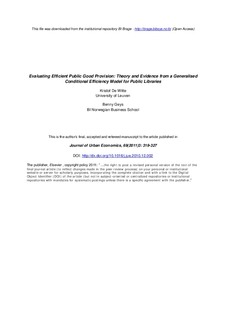Evaluating Efficient Public Good Provision: Theory and Evidence from a Generalised Conditional Efficiency Model for Public Libraries
Journal article, Peer reviewed
Permanent lenke
http://hdl.handle.net/11250/93598Utgivelsesdato
2011Metadata
Vis full innførselSamlinger
- Scientific articles [2181]
Originalversjon
10.1016/j.jue.2010.12.002Sammendrag
Provision of most public goods (e.g., health care, libraries, education, police, fire protection, utilities) can be characterized by a two-stage production process. In the first-stage, basic inputs (e.g., labor and capital) are used to generate service potential (e.g., opening hours, materials), which is then, in the second-stage, transformed into observed outputs (e.g., school outcomes, library circulation, crimes solved). As final outputs are also affected by demand-side factors, conflating both production stages likely leads to biased inferences about public productive (in)efficiency and its determinants. Hence, this paper uses a specially tailored, fully non-parametric efficiency model allowing for both outlying observations and heterogeneity to analyse efficient public good provision in stage one only. We thereby employ a dataset comprising all 290 Flemish public libraries. Our findings suggest that ideological stance of the local government, wealth and density of the local population and source of library funding (i.e., local funding versus intergovernmental transfers) strongly affect library productive efficiency.
Beskrivelse
Dette er siste forfatterversjon etter fagfellevurdering
